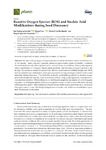Reactive oxygen species (ROS) and nucleic acid modifications during seed dormancy

Use this link to cite
http://hdl.handle.net/2183/25724Collections
- Investigación (FCIE) [1260]
Metadata
Show full item recordTitle
Reactive oxygen species (ROS) and nucleic acid modifications during seed dormancyDate
2020-05-27Citation
Katsuya-Gaviria, K.; Caro, E.; Carrillo-Barral, N.; Iglesias-Fernández, R. Reactive Oxygen Species (ROS) and Nucleic Acid Modifications During Seed Dormancy. Plants 2020, 9, 679.
Abstract
[Abstract] The seed is the propagule of higher plants and allows its dissemination and the survival of the species. Seed dormancy prevents premature germination under favourable conditions. Dormant seeds are only able to germinate in a narrow range of conditions. During after-ripening (AR), a mechanism of dormancy release, seeds gradually lose dormancy through a period of dry storage. This review is mainly focused on how chemical modifications of mRNA and genomic DNA, such as oxidation and methylation, affect gene expression during late stages of seed development, especially during dormancy. The oxidation of specific nucleotides produced by reactive oxygen species (ROS) alters the stability of the seed stored mRNAs, being finally degraded or translated into non-functional proteins. DNA methylation is a well-known epigenetic mechanism of controlling gene expression. In Arabidopsis thaliana, while there is a global increase in CHH-context methylation through embryogenesis, global DNA methylation levels remain stable during seed dormancy, decreasing when germination occurs. The biological significance of nucleic acid oxidation and methylation upon seed development is discussed.
Keywords
After-ripening
DNA methylation
Oxidation
RNA stability
Seed dormancy
Seed vigour
ROS
DNA methylation
Oxidation
RNA stability
Seed dormancy
Seed vigour
ROS
Editor version
Rights
Atribución 3.0 España
ISSN
2223-7747






